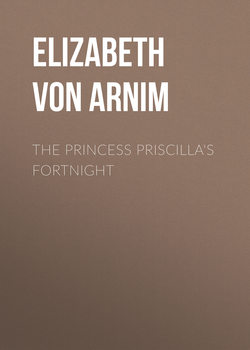The Princess Priscilla's Fortnight

Реклама. ООО «ЛитРес», ИНН: 7719571260.
Отрывок из книги
Her Grand Ducal Highness the Princess Priscilla of Lothen-Kunitz was up to the age of twenty-one a most promising young lady. She was not only poetic in appearance beyond the habit of princesses but she was also of graceful and appropriate behaviour. She did what she was told; or, more valuable, she did what was expected of her without being told. Her father, in his youth and middle age a fiery man, now an irritable old gentleman who liked good food and insisted on strictest etiquette, was proud of her on those occasions when she happened to cross his mind. Her mother, by birth an English princess of an originality uncomfortable and unexpected in a royal lady that continued to the end of her life to crop up at disconcerting moments, died when Priscilla was sixteen. Her sisters, one older and one younger than herself, were both far less pleasing to look upon than she was, and much more difficult to manage; yet each married a suitable prince and each became a credit to her House, while as for Priscilla,—well, as for Priscilla, I propose to describe her dreadful conduct.
But first her appearance. She was well above the average height of woman; a desirable thing in a princess, who, before everything, must impress the public with her dignity. She had a long pointed chin, and a sweet mouth with full lips that looked most kind. Her nose was not quite straight, one side of it being the least bit different from the other,—a slight crookedness that gave her face a charm absolutely beyond the reach of those whose features are what is known as chiselled. Her skin was of that fairness that freckles readily in hot summers or on winter days when the sun shines brightly on the snow, a delicate soft skin that is seen sometimes with golden eyelashes and eyebrows, and hair that is more red than gold. Priscilla had these eyelashes and eyebrows and this hair, and she had besides beautiful grey-blue eyes—calm pools of thought, the court poet called them, when her having a birthday compelled him to official raptures; and because everybody felt sure they were not really anything of the kind the poet's utterance was received with acclamations. Indeed, a princess who should possess such pools would be most undesirable—in Lothen-Kunitz nothing short of a calamity; for had they not had one already? It was what had been the matter with the deceased Grand Duchess; she would think, and no one could stop her, and her life in consequence was a burden to herself and to everybody else at her court. Priscilla, however, was very silent. She had never expressed an opinion, and the inference was that she had no opinion to express. She had not criticized, she had not argued, she had been tractable, obedient, meek. Yet her sisters, who had often criticized and argued, and who had rarely been obedient and never meek, became as I have said the wives of appropriate princes, while Priscilla,—well, he who runs may read what it was that Priscilla became.
.....
"Hush, hush, shut thy little eyes," soothed the mother, putting her hand over them. To Priscilla she said, with an obvious dawning of distrust, "But Fräulein, what reason can you have for hiding yourself?"
"Hiding myself?" echoed Priscilla, now very unhappy indeed, "I'm not hiding myself. I've got—I've got—I'm afraid I've got a—an affection of the skin. That's why I wear a veil."
.....